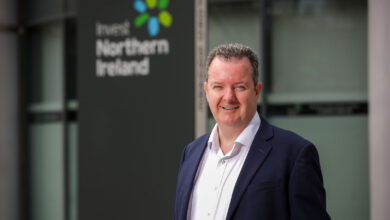Research in the marketplace
Research Commissioner Máire Geoghegan-Quinn talks to Meadhbh Monahan about the need for more integration between researchers and business and the benefits of an EU patent.
Europe’s Research, Innovation and Science Commissioner is “very impressed” with Northern Ireland’s progress within the ‘innovation union’.
“If you look at the applications that Northern Ireland companies put in and the rate of success, Northern Ireland, like Ireland, [is] above the EU average,” she notes.
The Commissioner was pleased at the UK’s decision not to cut research and innovation and she hoped that Ireland’s Finance Minister Brian Lenihan would follow suit and include “at least as much in the December budget as what was spent last year.”
She also appeals to Europe’s other government finance departments, claiming: “At a time when budgets are under pressure, it is sometimes easy, when looking at where to cut, to look at research and innovation as an easy target.”
The EU’s innovation union is one of seven flagship initiatives agreed under the Europe 2020 strategy in June 2010. It makes provision for the creation of innovation partnerships between universities and business, the strategic use of public procurement budgets to finance innovation, and a single European market for innovation.
It is “at the very heart of the political agenda in Europe,” Geoghegan-Quinn states.
José Manuel Barroso (President of the Commission) and Herman Van Rompuy (President of the European Council) are to discuss the innovation union for the first time at a European Council meeting in February.
“That’s a tremendous step forward because now, the most important political people in Europe are going to say: ‘This is the way forward’,” Geoghegan-Quinn adds.
The EU has a combined target of investing 3 per cent of GDP in research and innovation but it is currently only at 2 per cent.
“Sweden and Finland are the leaders in this area. But the problem in most of the European countries that haven’t reached the 3 per cent target is that it is made up of 1 per cent from the public sector and 2 per cent from the private sector, and it has fallen down in the private sector,” the Commissioner explains.
“We are trying to find ways of increasing the level of the private sector. We have re- iterated the 3 per cent target in the innovation union flagship but what we are saying this time is that we are going to do it in a smarter way,” she adds.
Officials from the Commission have met counterparts in every member state and have scrutinized their spending on research, innovation and development. Consequently, “a more realistic target within that 3 per cent” will be allocated to each member state.
Research and business
“We do basic research very well in Europe,” Geoghegan-Quinn contends. However, “we are not as good as they are to the east of us and the west of us, at bringing that basic research all the way to the market place which would provide opportunities for companies and would provide jobs for our people.”
The policies in the innovation union aim to do three things: make Europe a world class science-performer, revolutionise the way public and private sectors work together, and remove bottlenecks.
Geoghegan-Quinn explains that “along that innovation chain, there are obstacles that prevent researchers getting to the market.”
Those obstacles are the lack of an EU patent, the lack of common standards throughout the 27 member states, too many regulations, simplification of procedures and the lack of venture capital.
Geoghegan-Quinn is currently making suggestions in relation to each of the obstacles. “That’s the first time where we are looking at innovation, looking at the difficulties companies face, how we target those difficulties and push them out of the way.”
She believes that “it’s very important that companies on both sides of the border and companies between the island of Ireland, the UK and the rest of Europe collaborate and work together because the framework programme works on the basis of consortia such as universities, small companies and large multi-nationals getting together right across the European Union.”
MLAs and TDs have told the Commissioner that people often don’t know where to go get the information and don’t know how to apply for funding.
“I would encourage them to get involved more, to come out to us, talk to us because we are there to help and we feel that there’s a lot that we can do together,” she urges.
Funding
The framework programme is described by the Commissioner as “the largest publicly funded research programme in the world.”
She clarifies that it is only “a tiny proportion of the amount of funding for research throughout the union as a whole”. That is because the vast majority of funds come from the national governments or private sector companies. “They are the people who spend the real money,” she says.
The programme is used to get people, companies and third level institutions engaged.
“Importantly, we need much greater focus and co-operation between educational institutions, whether they are universities, research institutions or other types of technological institutions and private industry.”
This is done successfully in America, Geoghegan-Quinn observes. “We don’t do it as successfully on the island of Ireland as they do in other parts of the union. We need that co-operation and working together.”
Single EU market
The creation of a single market for innovation is supported in the innovation union in order to attract innovative companies and businesses.
To achieve this, Geoghegan-Quinn proposes patent protection, standardisation, public procurement and smart regulation.
She gives an example, saying: “If you take your laptop from Northern Ireland, Ireland or the UK to Europe, you have to get an adaptor to charge it or to plug it in. That shouldn’t be the case. It should be the same standards throughout Europe. That’s a political decision that politicians and governments are going to have to take. We feel that it’s an important decision because it’s another barrier or obstacle on the innovation chain.”
The cost of an EU patent is a deterrent. In light of this, the Belgian presidency has decided that this is “a huge priority for them,” Geoghegan-Quinn explains.
A decision on an EU patent should be decided before the end of their presidency in December, she revealed. “It’s an uphill battle and it’s all to do with translation, it’s all about languages, how many languages it should be available in etc. But if you had a European patent, the amount of money it would save for small and medium sized companies is incredible [€250 million]. So it’s something that we should certainly aim for,” the Commissioner insists.
In October, the former Employment and Learning Minister Reg Empey told agendaNi that there are “hundreds” of patents in the region that cannot be taken further because of problems with intellectual property rights.
He said that his department was investigating ways to bring business and academics together, through signing confidentially agreements, and using research expertise from business at the beginning of the project in order to make it more commercially acceptable.
Geoghegan-Quinn is supportive of this and wants to see a patent market that would allow a company to sell a piece of intellectual property that they are not using to a company in another member state that is doing a similar piece of research.
“If they had or could use that piece of intellectual property, it would help them to do a major amount of work or get a major commercial opportunity from it,” she concludes.






